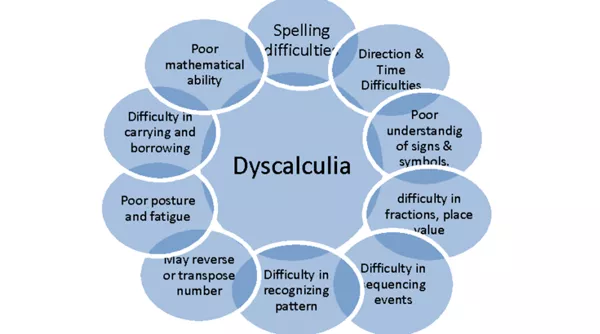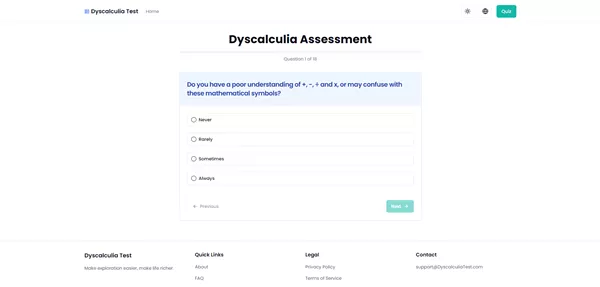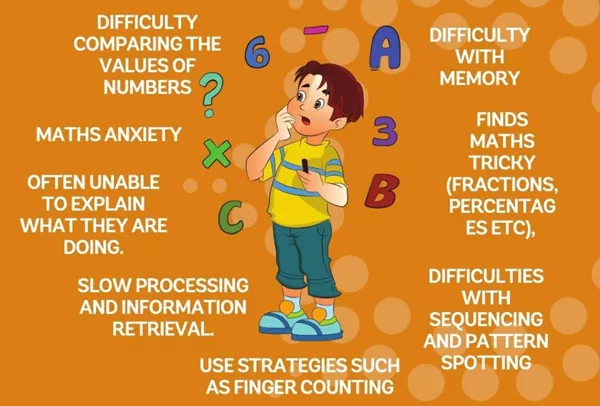Dyscalculia Testing: Identifying Math Disabilities and Their Impact
December 8, 2024 | By Aisha Bennett
Unlocking the Mystery of Dyscalculia: A Comprehensive Introduction
Dyscalculia is a learning disability that significantly impacts an individual’s ability to understand numbers and perform math tasks, yet it remains underrecognized. While many are familiar with dyslexia, which affects reading, dyscalculia is often overlooked despite its significant impact on daily life.

If you’ve ever struggled to balance a checkbook, calculate a tip, or manage time effectively, and this has been a persistent challenge since childhood, it may be worth exploring whether dyscalculia is a factor. Identifying dyscalculia early is essential for overcoming math challenges. At DyscalculiaTest.com, we simplify this process with a quick and accessible test designed to guide you toward solutions.

Our platform offers a user-friendly way to evaluate math-related challenges and quickly identify potential signs of dyscalculia. By taking our dyscalculia test, you can better understand your struggles and receive personalized recommendations to take the next steps.
What Is Dyscalculia?
Definition and Overview
Dyscalculia is a neurodevelopmental condition that makes it difficult to process numbers and mathematical concepts. It’s not just about being “bad at math”—it’s a genuine condition tied to how the brain processes numerical information.
People with dyscalculia might have trouble recognizing number patterns, solving basic arithmetic problems, or even distinguishing quantities. These challenges can affect both academic performance and everyday activities, such as shopping, cooking, or budgeting.
Dyscalculia vs. Math Anxiety
It’s important to differentiate dyscalculia from math anxiety, as the two are often confused. Math anxiety is a fear or discomfort associated with performing math, often due to negative experiences or societal pressure. Dyscalculia, on the other hand, is a neurological condition that persists regardless of confidence or environment.
If you suspect your struggles with math are more than just anxiety, our dyscalculia test can help clarify the root of the issue.
Understanding Dyscalculia Symptoms
Common Signs in Children and Adults
Dyscalculia can manifest differently depending on age. In children, it might look like an inability to grasp basic math concepts or difficulty learning multiplication tables. Adults, meanwhile, may struggle with tasks like managing finances, estimating distances, or understanding graphs.

Here are some common symptoms to watch for:
- Difficulty recognizing numerical patterns or sequences.
- Trouble understanding mathematical symbols (e.g., +, -, =).
- Struggles with estimating time, distance, or quantities.
- Persistent difficulty with basic calculations, even with repeated practice.
If these symptoms feel familiar, taking our dyscalculia test can provide clarity and guidance.
How Dyscalculia Differs from Dyslexia
Though both dyscalculia and dyslexia are learning disabilities, they target different cognitive functions. Dyslexia primarily affects reading and language processing, while dyscalculia impacts numerical comprehension.
Interestingly, some individuals may experience both conditions, as they share certain underlying neurological patterns. Our test at DyscalculiaTest.com helps identify these overlaps, ensuring you receive a comprehensive understanding of your challenges.
Getting Tested for Dyscalculia
How to Get a Dyscalculia Test
The first step in addressing dyscalculia is getting tested. Our platform provides a simple and efficient way to assess your math skills across core areas like arithmetic and logical reasoning. With just a few clicks, you can uncover key insights into your challenges.
Types of Dyscalculia Tests
Dyscalculia assessments typically include tasks that measure numerical reasoning, problem-solving, and working memory. At DyscalculiaTest.com, we’ve streamlined this process into a user-friendly format that you can complete from the comfort of your home.
What to Expect During the Assessment
Our test is structured to evaluate your mathematical understanding across different areas. Once completed, you’ll receive a detailed report that highlights your strengths and weaknesses, along with actionable suggestions. While our assessment is not a formal diagnosis, it can serve as a valuable first step toward seeking professional evaluation if needed.
By addressing these foundational topics, you can empower yourself or a loved one to better understand dyscalculia and its impact. Take the first step by visiting DyscalculiaTest.com and exploring how our test can help.
Whether you're a student, parent, or professional, our test offers a comprehensive starting point to better understand and manage dyscalculia. Begin now at DyscalculiaTest.com.
Diagnosing Dyscalculia: What You Need to Know
Identifying dyscalculia is an essential step in addressing math-related challenges and creating strategies for success in school, work, and daily life. A proper diagnosis requires a thorough evaluation by qualified professionals who specialize in learning disabilities.
Our platform, DyscalculiaTest.com, provides an accessible way to begin this journey. While our test is not a substitute for a formal diagnosis, it offers valuable insights and can guide you toward seeking professional evaluation if needed.
Criteria for Diagnosis
Dyscalculia is diagnosed based on specific criteria outlined in tools such as the DSM-5 (Diagnostic and Statistical Manual of Mental Disorders). These criteria focus on persistent difficulties in numerical reasoning and mathematical problem-solving that significantly interfere with daily functioning.
Key diagnostic factors include:
- Inability to understand or apply basic math concepts.
- Difficulty performing calculations, even with instruction and practice.
- Impacts on academic performance, work productivity, or everyday life tasks.
- Symptoms that are not explained by lack of education, other disabilities, or environmental factors.
A formal diagnosis involves assessments like standardized math tests, cognitive evaluations, and a review of developmental history.
Common Misdiagnoses
Dyscalculia is often misunderstood and misdiagnosed, as its symptoms can overlap with other conditions. Common misdiagnoses include:
- Math Anxiety: Unlike dyscalculia, math anxiety stems from emotional responses to math tasks rather than neurological challenges.
- ADHD: Individuals with ADHD may struggle with focus and organization, which can mimic symptoms of dyscalculia.
- Dyslexia: While dyslexia impacts reading, it may co-occur with dyscalculia and complicate diagnosis.
Our dyscalculia test is designed to help differentiate between these challenges, providing clarity for next steps.
Costs and Accessibility of Dyscalculia Testing
How Much Does It Cost to Get Tested?
The cost of dyscalculia testing varies widely depending on the provider and location. Private evaluations by specialists can range from $500 to $2,000. However, free or low-cost testing options may be available through public schools or local community programs.
At DyscalculiaTest.com, our test offers a budget-friendly starting point for identifying potential signs of dyscalculia, empowering users to take informed next steps.
Insurance and Financial Assistance Options
Additionally, public school systems in many countries offer free assessments for students under certain conditions.
For adults, local disability organizations or nonprofit groups may provide affordable evaluation services or connect individuals with financial assistance programs.
However, there are still many times when insurance or free support is not available. If you are still debating whether to seek professional advice, using the dyscalculiatest test platform is a good choice. It is true that it cannot provide a very accurate diagnosis or treatment, but it is your first choice for determining whether you need help.
Life with Dyscalculia
Coping Strategies and Accommodations
While there is no cure for dyscalculia, there are numerous strategies and accommodations that can make life easier for individuals with the condition:

- Technology Support: Tools like calculators, apps for managing budgets, and math-specific learning platforms can help mitigate challenges.
- Visual Aids: Charts, graphs, and visual organizers are useful for improving numerical understanding.
- Time Management Tools: Using timers and planners can assist with tasks that require estimating time or sequencing steps.
Our test is designed to provide a starting point for understanding your challenges. While it doesn’t offer a diagnosis or treatment, it can help you explore your next steps, including consulting professionals if needed.
Dyscalculia in Education and the Workplace
Dyscalculia can significantly impact both academic and professional success, but proper accommodations can make a world of difference:
- In Education: Students with dyscalculia may benefit from extra time on math tests, access to alternative learning methods, and individualized instruction.
- In the Workplace: Employees with dyscalculia can thrive with tools like scheduling software, numerical calculators, and task management systems. Employers are required to provide reasonable accommodations under laws like the Americans with Disabilities Act (ADA).
Start your journey toward overcoming math challenges with our dyscalculia test. Gain valuable insights and access resources to thrive in school, work, and daily life.
FAQs about Dyscalculia
How Can I Tell If I Have Dyscalculia?
Identifying dyscalculia starts with recognizing persistent challenges with numbers and math-related tasks, such as:
- Difficulty performing basic arithmetic (e.g., addition, subtraction).
- Trouble understanding numerical relationships, like greater-than or less-than.
- Struggles with everyday activities, such as managing money or estimating time.
If these challenges resonate with you, taking a preliminary dyscalculia test on our site, DyscalculiaTest.com, is an excellent first step. The test is designed to pinpoint signs of dyscalculia and help you determine whether to seek professional evaluation.
What Can Be Mistaken for Dyscalculia?
Dyscalculia symptoms can overlap with other conditions, leading to potential misdiagnoses. Common issues mistaken for dyscalculia include:
- Math Anxiety: Emotional stress about math tasks, which can affect performance but doesn’t reflect a neurological condition.
- ADHD: Poor focus and disorganization may mimic difficulty with numbers.
- Lack of Instruction: Inconsistent education or lack of access to resources may lead to math struggles unrelated to dyscalculia.
Our dyscalculia test helps differentiate dyscalculia from other challenges, providing clarity for further exploration.
Is It Worth Getting a Dyscalculia Diagnosis?
Yes, getting a diagnosis can be life-changing. Here’s why:
- Access to Accommodations: A formal diagnosis allows students and employees to receive necessary support, such as extra time on tests or tools for managing numerical tasks.
- Emotional Relief: Knowing the cause of your struggles can reduce frustration and self-doubt.
- Personalized Strategies: Diagnosis helps identify effective strategies to improve math skills and build confidence.
Our platform offers a simple, accessible way to begin this journey. With the insights gained from our test, you can decide if a professional evaluation is the right next step.
Is Dyscalculia Similar to ADHD?
While dyscalculia and ADHD are different conditions, they can co-occur. ADHD primarily affects focus, organization, and impulse control, while dyscalculia targets numerical comprehension and math skills.
In some cases, ADHD-related symptoms (like difficulty following instructions or staying focused on tasks) may amplify the struggles caused by dyscalculia. Testing and professional evaluation can help distinguish between these conditions and identify overlapping challenges.
Taking the Next Steps
Seeking Professional Help
If you suspect you have dyscalculia, professional help can guide you toward effective solutions. A licensed educational psychologist or neuropsychologist can conduct a comprehensive evaluation to confirm the condition and recommend personalized interventions.

Our online dyscalculia test is an excellent first step to better understand your challenges. While not a formal diagnosis, it provides valuable insights to share with professionals during your evaluation.
Resources for Further Support
Living with dyscalculia is manageable with the right resources. Here are some options to explore:
- Online Tools: Apps and websites offering math tutorials, budgeting aids, and time-management tools can provide daily support.
- Community Groups: Local or online communities offer support, advice, and shared experiences from others with dyscalculia.
- Professional Organizations: Groups like the National Center for Learning Disabilities (NCLD) and the Learning Disabilities Association of America (LDA) provide educational resources and advocacy for individuals with dyscalculia.
You don’t have to face dyscalculia alone. Take the first step today with our dyscalculia test and uncover valuable insights to guide your next steps.